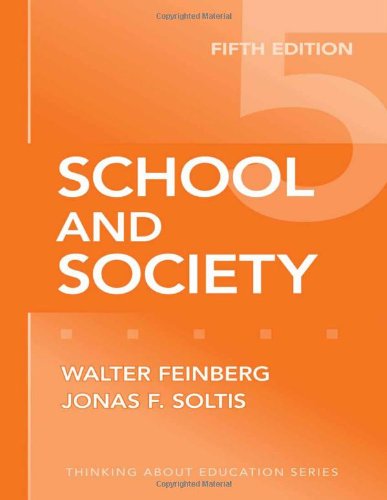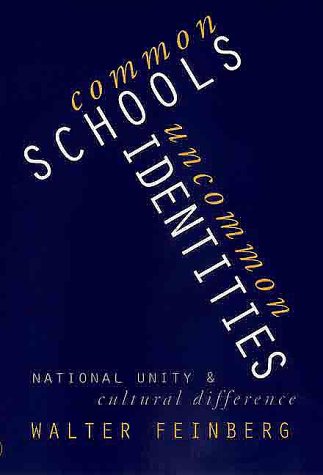Background
Feinberg, Walter was born on August 22, 1937 in Boston, Massachusetts, United States. Son of Nathan and Adeline (Weisberger) Feinberg.


(This widely used text has been expanded to include the mo...)
This widely used text has been expanded to include the most important issues in contemporary schooling, including: * New end-of-chapter sections for Further Reading. * New references added to the useful Additional Resources section. School and Society, Fifth Edition uses realistic case studies, dialogues, and open-ended questions designed to stimulate thinking about problems related to school and society, including curriculum reform, social justice, and competing forms of research. Written in a style that speaks directly to today's educator, this book tackles such crucial questions as: Do schools socialize students to become productive workers? * Does schooling reproduce social class and pass on ethnic and gender biases? * Can a teacher avoid passing on dominant social and cultural values? * What besides subjects do students really learn in schools? School and Society is one of the five books in the highly regarded Teachers College Press THINKING ABOUT EDUCATION SERIES, now in its Fifth Edition. All of the books in this series are designed to help pre- and in-service teachers bridge the gap between theory and practice. Praise for Previous Editions! ''I have been surprised and pleased by the relevance of this particular book to the lives and work of my beginning teachers.'' -- Teaching Education ''This series does a masterful job of bringing together the basic issues and teaching methods that should frame social and philosophical foundations curricula.'' -- Educational Theory
http://www.amazon.com/gp/product/0807749850/?tag=2022091-20

(One of the most hotly debated issues in contemporary educ...)
One of the most hotly debated issues in contemporary education concerns the tension between the demands of such groups as blacks, Latinos, gays, women, and the handicapped for a curriculum that recognizes their particular identity-and the competing position that the role of public education is to infuse children with a common American identity. In this book, a distinguished philosopher of education takes on that debate, indicating the underlying ethical issues on each side and showing how schools can promote both national and cultural identities. Walter Feinberg develops a theory of education that is twofold: it is sensitive to the concerns of parents and community members who want the public schools to reinforce their particular values and group identity, and it also maintains a commitment to the "principled reasons" for public education-the general ideals that public education shares with a liberal political philosophy, particularly equality of educational opportunity, freedom of association, and individual development. Feinberg develops an understanding of basic principles that schools should use in addressing cultural differences, tests these and shows how liberalism is indeed compatible with cultural recognition.
http://www.amazon.com/gp/product/0300082924/?tag=2022091-20

(Japan and the Pursuit of a New American Identity is a fas...)
Japan and the Pursuit of a New American Identity is a fascinating account of America's obsession with Japanese education and industry and the effects of this obsession on American schools, work, and national identity. By assessing the limits of American individualism and Japanese collectivism in an increasingly multicultural age, Walter Feinberg explodes the popular notion that Japan can serve as a proper model for American society and, more specifically, the American educational system. He then goes on to articulate some of the challenges and possibilities that multiculturalism presents for American education. He concludes that the role of education in renewing the the ideals of democracy is pivotal if America is to reestablish its identity and chart a course for educational reform in a multicultural age.
http://www.amazon.com/gp/product/0415906830/?tag=2022091-20
Feinberg, Walter was born on August 22, 1937 in Boston, Massachusetts, United States. Son of Nathan and Adeline (Weisberger) Feinberg.
Bachelor of Arts, Boston University, 1960;
Doctor of Philosophy, Boston University, 1966.
Assistant professor education Oakland University, 1965-1967. Assistant professor philosophy education University Illinois, Urbana, Illinois, 1967—1970, associate professor educational policy studies, 1970—1975, professor educational policy studies and philosophy of education, since 1975, Charles D. Hardre professor philosophy of education, 2005, professor bureau educational research, 1977—1980, 1986—1989, since 2006. Director Medicine and Society Faculty Program University Illinois, Urbana, 1981—1985, Program for Study of Cultural Values and Ethics University Illinois, 1989—1994.
Co-founder institute philosophy education Fudau University, China, since 2007.
(In Common Schools/Uncommon Identities, Walter Feinberg ho...)
(One of the most hotly debated issues in contemporary educ...)
(Japan and the Pursuit of a New American Identity is a fas...)
(This widely used text has been expanded to include the mo...)
(Book by Feinberg, Walter)
(New copy. Fast shipping. Will be shipped from US.)
Member Philosophy Education Society (president 1988-1989), American Educational Studies Association (president 1979), American Philosophy Association.
Married Eleanor Kemler, June 21, 1964. Children— Deborah Lee, Jill Suzanne.
